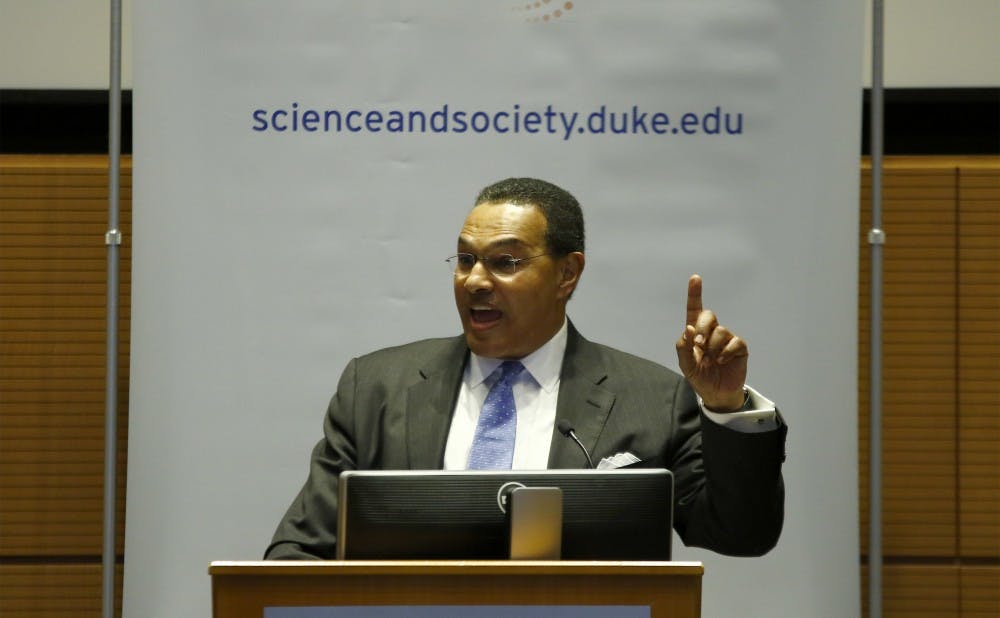The president of the University of Maryland, Baltimore County, called for rethinking the way minorities are treated in science, technology, engineering and math fields during a talk sponsored by the Duke Initiative of Science and Society Wednesday.
Freeman Hrabowski discussed his efforts to increase opportunities for minorities in STEM fields at UMBC, tabbed the top up-and-coming university by US News & World Report. During the talk at the Trent Semans Center, he praised Duke for its support for diversity in graduate programs but said it could improve its undergraduate opportunities.
“You attract some of the best students of all races in the country. I would say to Duke you should be among those institutions producing students who are doing well enough in science and engineering to go on to earning Ph.D.s in science and engineering and right now you are not,” Hrabowski said.
At UMBC, Hrabowski led the creation of the Meyerhoff Scholars Program, which provides a support system for students interested in STEM. Several graduates of the scholarship program were in attendance at the talk, including Kafui Dzirasa, assistant professor of psychiatry and behavioral sciences and a recipient of the 2016 Presidential Early Career award.
The lack of minority students in STEM is a problem, Hrabowski said, noting that universities must address the culture of natural sciences and engineering departments. Solutions—including smaller class sizes, team-based learning and less emphasis on “weed-out” courses—have broad benefits.
“When you’re able to help one group, like students of colors, you help others,” he said. “It’s not just black students who are not doing well in science and engineering.”
Hrabowski serves as chair of the Presidential Advisory Commission on Educational Excellence for African Americans and was listed one TIME Magazine’s 100 most influential people in the world in 2012. He received an honorary degree from Duke in 2005.
In an introduction to the talk, President Richard Brodhead noted that Hrabowski was a “person of the most captivating eloquence” and described his involvement in the children’s march in Birmingham, Ala., during the Civil Rights Movement, for which he was arrested.
A mathematician by training, Hrabowski said listening to Martin Luther King, Jr. and being jailed were transformative experiences.
“I always from that point on connected solving math problems with solving problems of society,” he said. “The most interesting problems could not be solved quickly.”
As chair of President Barack Obama’s commission on educational excellence, Hrabowski said he sees data that concerns him. Less than 0.5 percent of scientists at the National Institutes of Health are black and no national agency has even one percent of black Ph.D. scientists, he explained. Only 5 percent of American bachelor’s degrees are given in natural sciences or engineering, but among minorities the figure is between 2 and 3 percent.
“The dream should be that people of all races are getting to know each other well enough, trusting each other enough, ending up with the skills and the competence to know what’s necessary to study problems of humankind,” he said.
Freshman Robyn Guo said she enjoyed the lecture, but noted she did not know what to expect.
“As an Asian American, I know that we’re not technically underrepresented in science but I did want to learn about how other people thought about the whole issue,” she said. “I definitely want to learn more about these issues.”
Guo—who is planning to pursue a degree in biology—said Hrabowski’s emphasis on supporting K-12 education programs for minorities in STEM was important.
Members of the audience of more than 200 posed questions about inequalities and how to help younger students prepare for tough college classes.
“Any child who is going to do well in STEM has to learn to read and enjoy reading,” Hrabowski said. “We have a tendency to separate arts and humanities from science and engineering.”
The event was the second of three distinguished speakers for the lecture series. Rep. Bill Foster spoke last November as the first speaker, and The New York Times science writer Gina Kolata will speak March 22.
Adam Beyer is a senior public policy major and is The Chronicle's Digital Strategy Team director.

